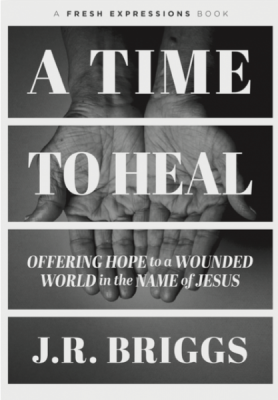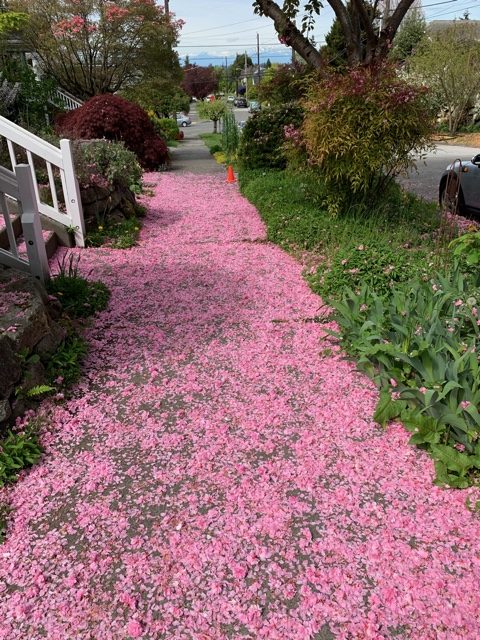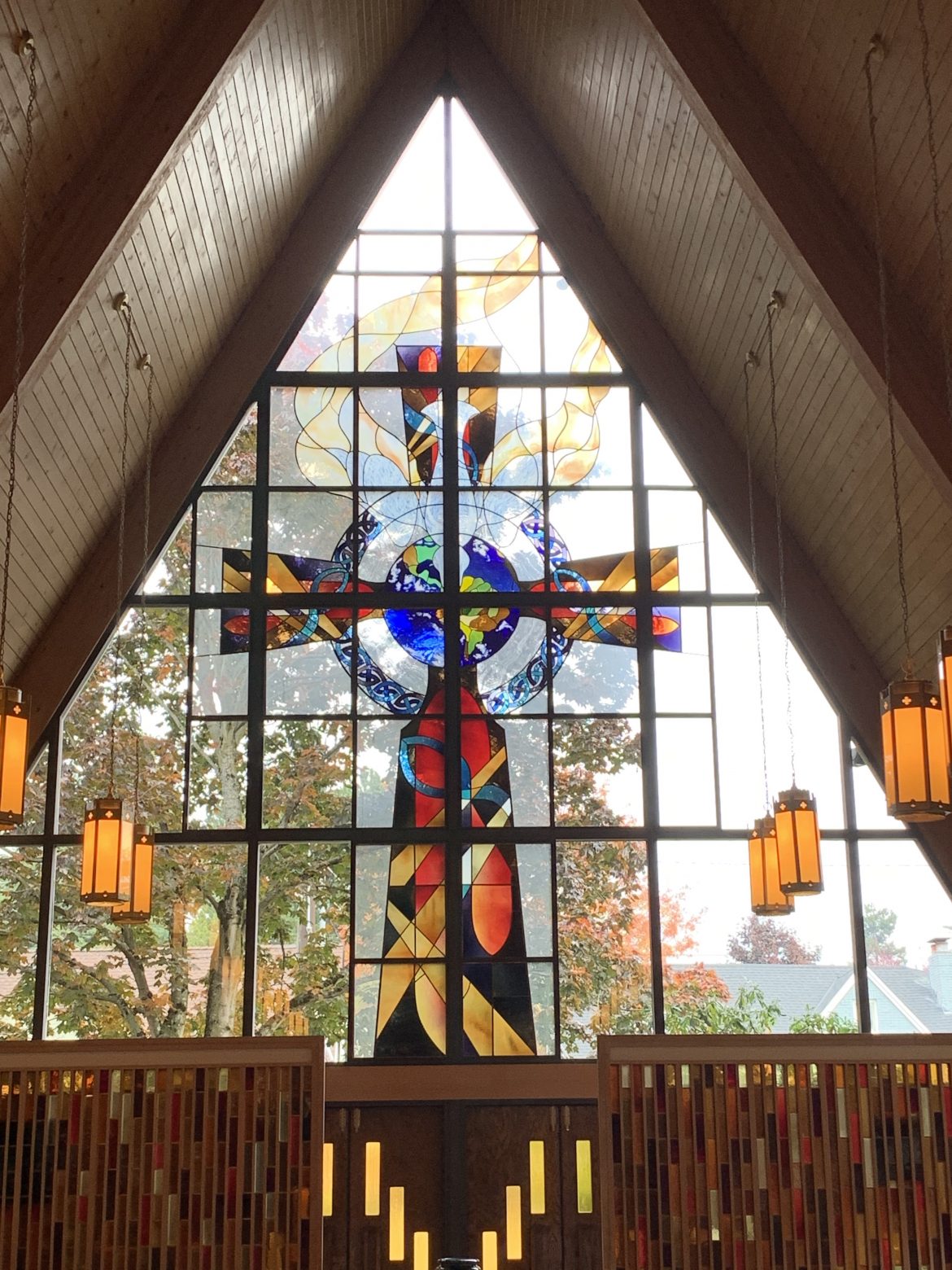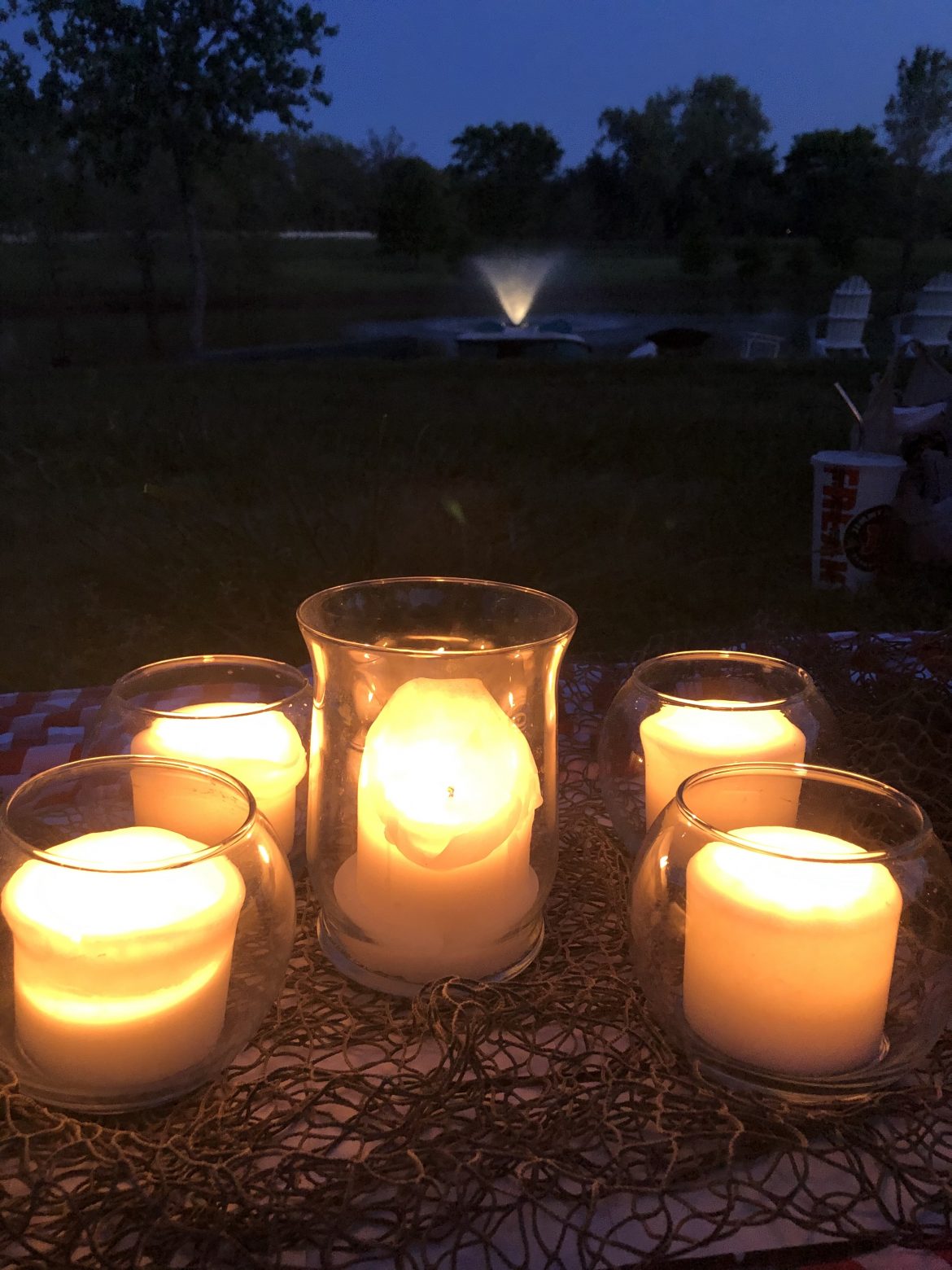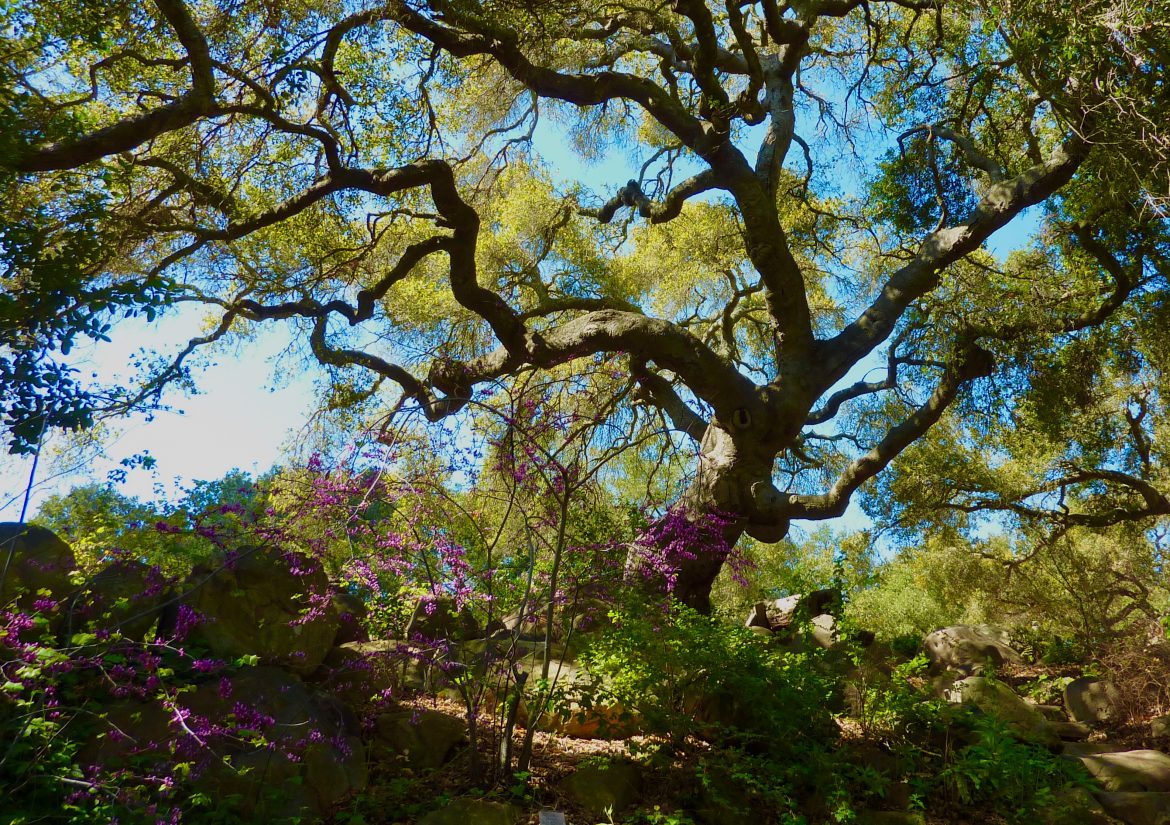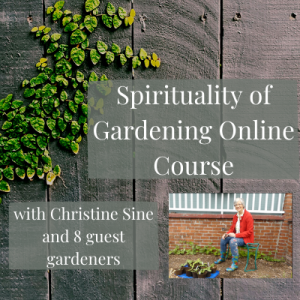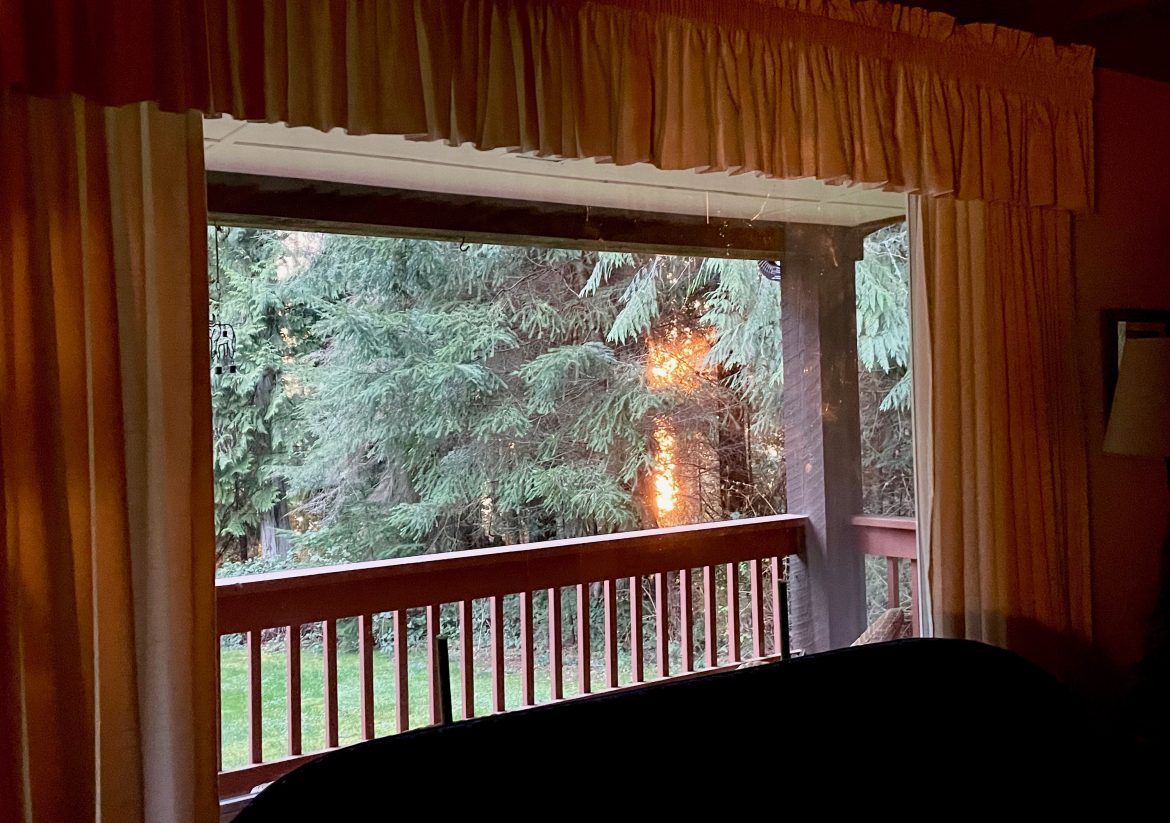by guest writer, J.R. Briggs,
“A Christian response of love in the midst of a global tragedy is far from unprecedented. We’re grateful to read stories of the past, but what about the future? Our call is to train our eyes – and help other people look for those in need of healing, even when it isn’t always apparent. If the world is ever going to consider looking in the direction of church for its healing, we must first look in these ten specific areas.
1. See the Bible as a book written to traumatized people.
Consider who the Bible was most frequently written to. The Scriptures – both Old and New Testaments – were not written to comfortable, healthy people in power, but instead to a group of discouraged, displaced, distressed, and oppressed people marked by trauma. Think of the stories of traumatized people found in the Bible:
- The runaway and abused slave girl Hagar.
- Joseph was sold into slavery by his own brothers.
- Noah’s family witnessed the destruction of the world through a global flood.
- Jonah was trapped in the stomach of a large fish for a few days after suffering a life-threatening squall.
- The entire nation of Israel was enslaved and in exile by the oppressive, unjust pagan nation of Egypt.
- Moses was on the run for his life after murdering an Egyptian.
- The prophet Elijah fled because of the death threat from evil tyrants.
- Job’s immense emotional, relational, and physical suffering.
- Tormented parents in Bethlehem who had experienced infanticide. Mary would have been friends and neighbors with mothers whose baby boys had been murdered by King Herod.
- Mary and Joseph fled to Egypt as refugees.
- Mary Magdalene was delivered from not one, but seven demons (and later became one of Jesus’ closest followers).
- John the Baptist experienced a gruesome beheading at a royal banquet.
- Jesus suffered naked on the cross through harrowing crucifixion.
- Early Christians were arrested, persecuted, and executed in the book of Acts.
In the pages of our Bible, trauma is everywhere. It is essential we read Scripture through the lens of trauma. The book of Lamentations and much of the Psalms contain raw and desperate prayers of suffering people. If the Old Testament was written mostly to the people of God who were in exile, and if both testaments were written to people who were oppressed, traumatized, and suffering, how might this shape how we read our Bibles today?
One of the simplest and most practical ways for congregations to cultivate a good kingdom imagination as healers is to allow the biblical text to shape our individual and collective thinking. If we can see the overarching story of Scripture – the shalom-creating God and a shalom-rejecting humanity, who are traumatized and in need of being saved, delivered, and healed by a shalom-bringing Jesus – our people will begin to see more fully the vision of what it means to live like Jesus. But it may mean pastors need to preach other difficult texts not often preached on, such as the Psalms of Lament. The Body of Christ to a Hurting World?
You may want to start by journeying through the gospel of Mark, which, as we explored earlier, is laden with healings, right from chapter one. Or, you may want to study and explore Dr. Luke’s gospel and pay close attention to those stories of healing. Look at the parables about healing and trauma. Consider the story of the Good Samaritan in Luke 10. The Samaritan soothed the wounded man with oil and wine and bandaged his wounds. He then took him to an inn to care for him further. He even handed the innkeeper two silver coins and told him to be a part of the healing process, too. Have you ever pondered this story through the lens of healing? As you immerse yourself in the stories of healings in the gospels, pause and read them slowly. Ask and discuss with others where there are wounds and brokenness and where we long to experience healing in our own lives. And then ask where we might join God in his work of healing in specific and practical ways. Inquire where there are areas, groups of people, or individuals in our community who are hurting and in need of experiencing radical compassion. Where can we be the sozo people of God?”
This excerpt was taken from A Time to Heal: Offering Hope to a Wounded World in the Name of Jesus by J.R. Briggs, which was released on April 27, 2021.
Bio for J.R. Briggs

Dr. J.R. Briggs is the founder of Kairos Partnerships, an organization that equips, empowers, encourages, and serves as a companion to leaders on the journey of leadership and ministry. He is a coach, consultant, seminary professor, and author of several books on topics which seek to empower leaders.
Sign up to join us for this virtual retreat experience Making Time for a Sacred Summer with Christine Sine and Lilly Lewin!
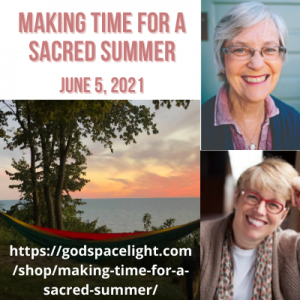
by Christine Sine,
Some of you may remember that last year at this time my daily awe and wonder walks were the delight of my life. They kept me anchored in the beauty of creation and the wonder of all I see around me. This year I have been restricted to the house. My severe allergies have had me coughing through the night and I have been banned, at least temporarily from my walks.
So now I sit in my office or our living room looking out longingly at our cherry tree or neighbour’s flowering tree across the street. Occasionally I don my mask and dash out with my camera for a quick photo shoot, and in the process I realize that my focus on the flashy beauty of flowers can mean I lose so much of what God wants to reveal to me.
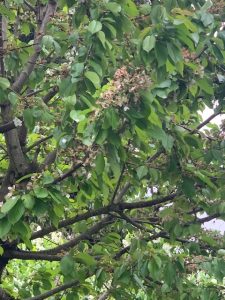
Dying Cherry blossoms
Our cherry tree is now adorned with dead and dying blooms, brown and sad looking on the branches. The flash of colourful flowers only lasted a couple of weeks, but in that time they did the job for which God had created them. They attracted bees and other pollinators that fertilized the fruit I long for. When I get close, I now see those seemingly dead flowers are actually small berries slowly growing inconspicuously along the branches. Oh how I wish those luscious, red berries would immediately appear. I love the blossoms and I love the fruit, but I hate the in-between time, even though I know it is essential to growth.
Then I think about my own life in which there have been seasons of blossoming and fruit, and that often despised in-between stage of growth. I feel as though I am in one of those times at the moment and I am impatient.

Pathway covered in cherry blossoms
Then I look at my neighbour’s tree. It, too, has shed its blossoms and now they lie as a colourful trail along the sidewalk. Psalm 32:8-9 springs to mind:
I hear the Lord saying, “I will stay close to you,
instructing and guiding you along the pathway for your life.
I will advise you along the way
and lead you forth with my eyes as your guide.
So don’t make it difficult; don’t be stubborn
when I take you where you’ve not been before.
Don’t make me tug you and pull you along.
Just come with me!”
How like the God of love to speak through that which is broken or dying. How like the God of love to provide comfort and direction in this way and how easily I could have missed it because I was looking back with envy to the blossoms that once were or hankering after the full grown fruit and the harvest I hope will come.
How many of us, as we near the end of this pandemic isolation, feel that we are in an in-between stage of life? How many of us are impatient for the fruit that is not yet fully formed or look back with longing at the life that blossomed pre-COVID? And how many of us are in danger of missing the pathway that God is laying out for us because we are impatient to move on?
Don’t you love the thought that we are led along the pathway of our lives with the divine eyes to guide us? And the thought that God might need to tug us along because we don’t want to walk a path we have not travelled before is profound. I hope you will take some time to reflect on this today. Gaze at the petal strewn path for a couple of minutes. What do you feel that God is saying to you? As I did so this weekend, the following prayer/poem bubbled up within me:
Let the pathway of your life unfold before you.
In all things trust God,
In all times believe God,
In all places follow God.
Be anxious for nothing,
Rest in each moment,
Enjoy the gifts,
Hold close to the sorrows,
Rejoice in the promises,
Be content with all it holds.
Let God’s eyes guide you.
And take you where you have not been before.
© Christine Sine 2021
Sign up to join us for this virtual retreat experience Making Time for a Sacred Summer with Christine Sine and Lilly Lewin!

I love the way this service blends Taize music, Celtic traditional songs and American spirituals in today’s service.
A contemplative service with music in the style-of-Taize. Carrie Grace Littauer, prayer leader, with music by Kester Limner and Andy Myers.
Permission to podcast/stream the music in this service obtained from One License with license #A-710-756 with additional notes below:
“Your Word, O Lord, is a Light (C’est toi ma lampe)” and “L’ajuda Em Vindra (I Lift up my Eyes to the Hills)” are songs from the Taize community in France. Music copyright and all rights reserved by GIA/Les Presses de Taizé.
“Down in the River to Pray” is a traditional American spiritual found in the public domain.
Arrangement by Kester Limner, shared under the Creative Commons License, Attribution (CC-BY).
“Deep Peace” – Text: Celtic traditional, adapt. Ray Makeover.
Text and music copyright 2009 Ray Makeover, Augsburg Fortress. All rights reserved.
www.saintandrewsseattle.org
by Kate Kennington Steer, all images by Kate Kennington Steer,
The eye of the great God,
The eye of the God of glory,
The eye of the King of hosts,
The eye of the King of the living,
Pouring upon us
At each time and season,
Pouring upon us
Gently and generously,
Glory to thee,
Thou glorious Sun.
Glory to thee, thou Sun,
Face of the God of Life.
Alex Carmichael, Carmena Gadelica (III, 307)
One year on from my decision to trace the course of light through the natural seasons by intentionally marking the solstices, equinoxes and cross-quarter days. What strands can I pull free from all I have written about these pinnacle points of this year’s light so I can embed them into my becoming? Trace the colours:
At Beltaine, fresh lime, pea and peridot greens emerged under pale, finespun gold; strengthened into curling petals of mauve and lavender, a froth of white and cream at the Summer Solstice; fruited as tongues of ruby, vermillion, scarlet, fuschia pinks and reds at Lughnasa; flourished into burnished saffron and golden ochre at the Autumn Equinox; faded into dove grey, taupe and charcoal by Samhain; folded into midwinter’s depths of blueblack and indigo at the Winter Solstice; re-emerging as pewter, sepia and khaki by Imbolc; then as the number of hours of daylight reaches its’ crucial moment, an acid, chrome and orpiment yellow blaze of resurrection promise is released after the Spring Equinox. Height and angle, brightness and dimness, the endless balancing game between blue and yellow, between cold and heat: the hues and tones of every colour are mixed on the palette of light into infinite variety, year-in, year-out. This light continues even through the perpetual challenge of the physical and emotional ‘grey days’, the seeming endless blank of depression, a fog that threatens to overwhelm all memory of how things might be different: and yet it never quite eliminates the hope that this spiral of emerging colours, under the year’s changing arc of light, has imprinted the eternal in me.
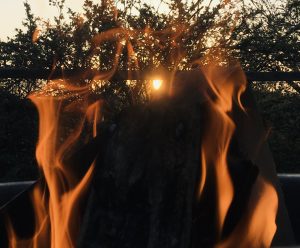
And through it all comes the twist of fire to bind or loose, to distil or destroy, to dance with or lament through: the urgent wonder of turning aside to watch the burning bush and notice the whisper of Invitation, as encapsulated by Abba Moses in the desert: ‘why not become fire’? Why not let the fire of God burn through you? Why not let the fire of God reveal your essence? Why not let the fire of God light you up as beacon, as warning, as prophecy, as celebration, as companion, as guide, as protection, as succour, as lover, as … ? Fire’s trail reminds me to love the light in all its guises; it releases me to be passionate about loving colour and light in mind and body, heart and soul.
In the book of Isaiah, the I AM says, countless times: ’Now I Am revealing’… How do I notice the I AM? How do I notice the I AM in my now? Do I even notice the present tense of the I AM? What I AM light am I taking for granted today? Am I not seeing how the early morning snow, under heavy slate skies, became sparkling drips dropping from tree limbs, as mid-morning sun lit only the very extremities, the swelling tips of branches; how light-grey clouds suddenly massed and masked the differences between the clean windowsill and dusty cupboard top; how such heavy flatness became pierced through by midday glowings, fleeting and uncertain, highlighting the furze of greening birch trees on the hill at one moment, collapsing them into umber shadow the next? If I had not looked up – and out – a few times in the past few hours I would have missed all this plenitude.
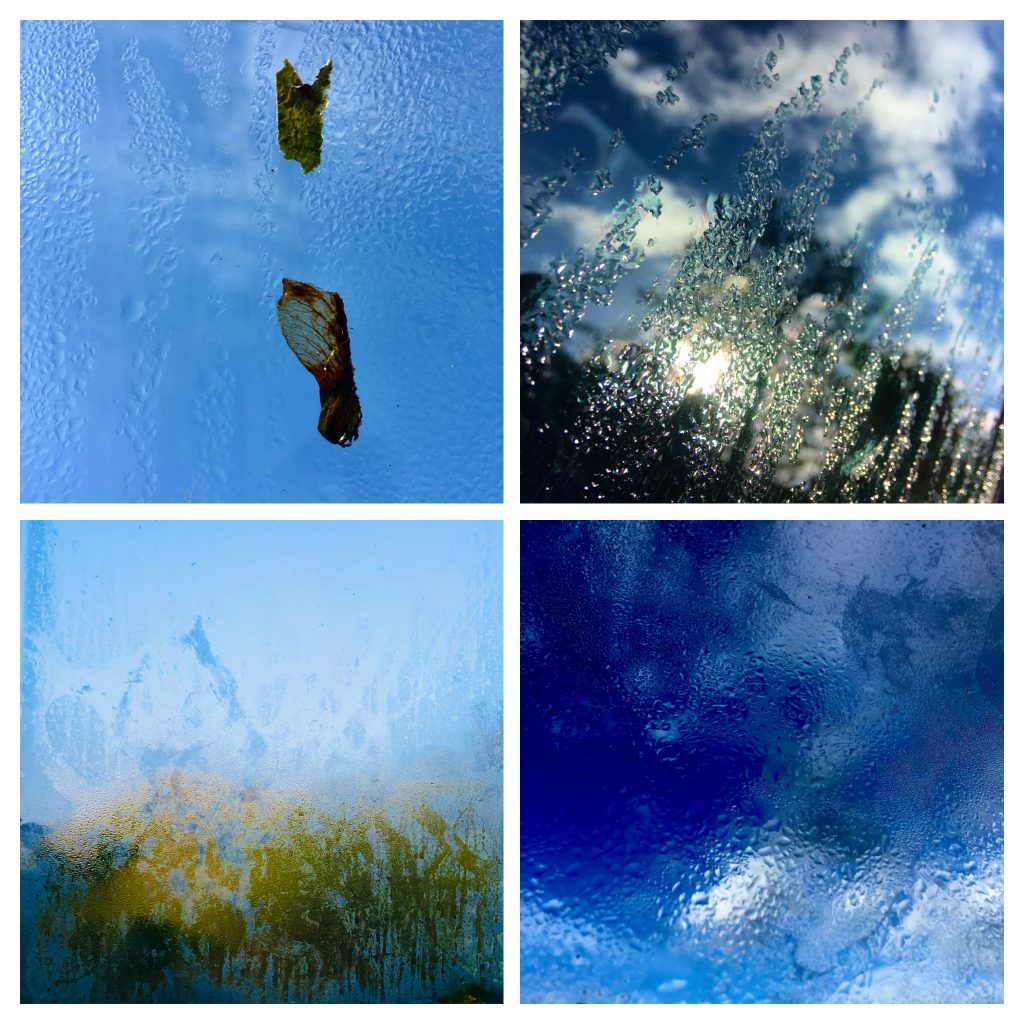 Such sky-watching is possible at most moments, in most times, as I sit up in bed, unless the very thing I treasure as a contemplative photographer, my sensitivity to the I AM-light, becomes the condition I need to protect myself against (on those days I have to pull down black-out blinds to nurse a migraine or pull curtains to allow a weakened, weary body lie down quietly in the semi-dark and rest).
Such sky-watching is possible at most moments, in most times, as I sit up in bed, unless the very thing I treasure as a contemplative photographer, my sensitivity to the I AM-light, becomes the condition I need to protect myself against (on those days I have to pull down black-out blinds to nurse a migraine or pull curtains to allow a weakened, weary body lie down quietly in the semi-dark and rest).
Such sky-watching has become the antidote to my self-entered preoccupations and the hamster-wheel of my ruminating mind. It immediately allows me to focus on the wonder of our created earth, and the abundance of minute details that Sophia dances before my eyes to demonstrate, time and again, that I am not alone; that the eternal I AM is present in all my details, if I have eyes to see.
Such sky-watching is also the corrective to my craving to see change. I am impatient for my healing from the chronic functional neurological disorder which has affected me for the past thirty years. I am desperate to see a permanent break in my cycles of clinical depression. I am longing to alter the patterns of self-sabotage and lack of self-compassion which dictate how I use (and fail to refuel) my precious, fragile energy source. I am incredibly fortunate to have a gifted counsellor and beloved friends who reflect back how my healing is happening, but if I ever need a cosmic reminder that change is happening I need only look out the window, and then look back into my mundane habitat with renewed vision.
 Such sky-watching confirms in me my hunch that healing is about wholeness, not wellness. There may be little variation in the physical symptoms of my condition from one year to the next, but how I deal with those symptoms, how I understand and articulate my feelings about them, how they colour my relationship with my Source, is open to infinite shifts and adjustments, and will in turn, affect how I interact with the people and world around me.
Such sky-watching confirms in me my hunch that healing is about wholeness, not wellness. There may be little variation in the physical symptoms of my condition from one year to the next, but how I deal with those symptoms, how I understand and articulate my feelings about them, how they colour my relationship with my Source, is open to infinite shifts and adjustments, and will in turn, affect how I interact with the people and world around me.
Such sky-watching has become intricately linked with my determination to turn away from living a fear-filled life, to embodying a creativity-filled life, even if – especially if – most days I don’t leave my bed for more than an hour or two.
This too then, is what this year has brought me: a reconnection to the bedrock need for gratitude as a transforming force in my life. Sky-watching fills me with the wonder of a life based on abundance, not on lack. So there is plenty of material into which I can go ‘mining for gold’ as I have written about several times over the course of this last year. Sky-watching encourages my feeble faith to believe that there is always, always, a wonder for me to see, inside and outside of myself, if I will but continue to follow the path of Light, the one the God of Holy Surprises lays down before me, through every twist and turn.

This new bundle is on sale until May 11th and includes our best selling book, To Garden with God and The Gift of Wonder Prayer Cards.
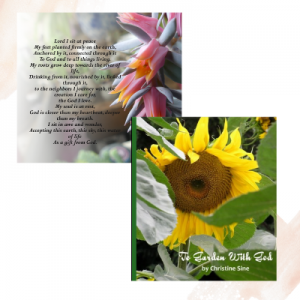
By Lilly Lewin
EASTER CUP PRAYERS…
We are entering the 5th week of Easter. Eastertide runs til May 23rd this year when we celebrate Pentecost and pouring out of the Holy Spirit.
This week at thinplaceNASHVILLE, our house church community, we got outside and actually sat by the water at the “beach” and reflected on John 21 and Jesus cooking breakfast for his disciples.
It’s one of my favorite passages! I use it in my workshops to teach experiential worship… how to take a passage of scripture and make it interactive and multi-sensory. Each time I listen to or teach from this passage, I learn something new!
At thinplaceNASHVILLE, we practice Lectio Divina , listening to the passage read by three people and we use three different translations so we hear familiar passages in fresh ways. Lectio Divina enables the Holy Spirit to be the teacher and each person who listens receives the “sermon” they need to hear for that day.
Our house church meets on Sunday and Tuesday nights via Zoom. With two different groups, I have the gift of listening and learning from the passage twice each week. This week I was reminded of my need to drink from the CUP OF PROVISION and the CUP OF INVITATION.
NOW GET YOUR CUP TO PRAY WITH THE CUP OF PROVISION
In JOHN 21, some of the disciples have gone fishing and fished all night, catching NOTHING. Then they notice Jesus on the beach and he invites them to fish on the other side of the boat. Jesus doesn’t just give Peter and his friends some fish, he provides an ABUNDANCE FISH! And not just fish, LARGE FISH! More than enough for them to have some to eat, and have some to sell to provide for themselves in the days ahead.
THE CUP OF PROVISION might also be called the cup of ABUNDANCE…
Do you and I remember that Jesus provides for us?
Do you and I remember that Jesus is the God of abundance, not scarcity?
HOLD YOUR CUP.
How has Jesus provided for you this week? This year? Take time to be thankful. Consider all the ways Jesus has provided for you throughout this last year in the midst of the pandemic.
How do you need Jesus to provide for you this week, and in the months ahead? Talk to Jesus about this.
Jesus already had fish cooking on the fire… he already had breakfast prepared for the hungry disciples who’d been up all night. He gave them breakfast and the abundant provision of the 154 BIG FISH.
Think about a time when Jesus already had breakfast ready for you. A time when you got somewhere or something happened that you just knew that Jesus had this all prepared ahead of time. How does it feel to know that Jesus knows what you need?
Are we drinking from the cup of abundance today or the cup of not enough?
As you drink from your cup today, continue to thank Jesus for his provision and make your cup a cup of abundance each day this week.
THE CUP OF INVITATION
All of John 21 takes place after the trauma of the crucifixion with the uncertainty of what happens now that Jesus is resurrected. Peter returns to what is familiar, what makes sense, and what might make him some money too. He wasn’t sure what he was supposed to do next.
Maybe you are feeling like Peter and the disciples, it’s been a really long, weird season of COVID. Maybe you, too, are uncertain about what to do next.
HOLD YOUR CUP and talk to Jesus about where you are and how you are really doing and feeling. What do you notice? What are you confused or frustrated about? What are you wondering about as you look ahead to the next season? Give Jesus these things to hold.
After breakfast, Jesus reminds Peter of his purpose. Jesus reinstates Peter after his betrayals. Jesus invites Peter to fish for people again… this time inviting him to feed his sheep. He reminds Peter of his calling. And says, FOLLOW ME.
Consider what Jesus has called, invited you to do in the Kingdom of God. Take time to thank him for this. How has it changed over the years?
What or how do you need to REDISCOVER the INVITATION OF JESUS IN YOUR LIFE?
How is Jesus inviting you to FOLLOW him again?
As you drink from your cup this week, Pray and ask how you are being invited on a new adventure with Jesus!
REMEMBER as my friend Pastor/Professor Frank Ponce says,
“Jesus has provision for the NEW REALITY he is inviting you into” and Jesus has abundant provision for the next leg of this adventure!
©lillylewin and freerangeworship.com
Sign up to join us for this virtual retreat experience Making Time for a Sacred Summer with Christine Sine and Lilly Lewin!

Note: As an Amazon Affiliate, I earn an amount on qualifying purchases. Thank you for your support for Godspace in this way.
by Laurie Klein
An annual date dedicated to celebrating trees
Say you have one day to live. This one. What would you do?
See the ocean? Meet your hero? Sky dive?
Perhaps you’d fund a new well in an African village. You might leave notes inside your books for future readers to find. You could pre-order a single rose, to be delivered each month to someone you love.
Renowned poet W. S. Merwin declared, “I’d plant a tree.”
When I read his answer, I pictured the literary giant’s final act taking root—literally—unfurling a legacy both sturdy and verdant. Talk about an encore.
Then I learned about his sideline.
Up until his death at 91, Merwin painstakingly restored 19 acres of wasteland in Maui, Hawaii. He and his wife regenerated thousands of native plants and trees—including one species considered technically extinct. “Putting life back into the world” enlivened him.
Merwin, two-time Pulitzer Prize winner, embodied the spirit of Arbor Day. Dropping to his knees most afternoons for 35 years, a poet considered a “national treasure” established one of the most lush and diverse palm gardens on earth.
Today amid tropical breezes the Merwin Conservancy rustles and sways, home to the plover and Chinese thrush, whose songs join the endless anthem of arching fronds.
Do you sense a biblical echo? “And all the trees of the field will clap their hands,” Isaiah wrote.
Poet e. e. cummings praised “the leaping, greenly spirits of trees”—suggesting simultaneous dance, sport, and standing ovation.
An unknown psalmist, on the other hand, compares believers to trees: “The righteous will flourish like a palm tree . . . They will still bear fruit in old age, they will stay fresh and green.”
And doesn’t our faith’s ongoing renewal, by its very nature, suggest countless ways to leave our hallowed, harrowing world more vibrantly fertile?
By the Master Gardener’s design, vital commonalities link trees with humanity. Attentive, generous community helps both species not only survive, but thrive. People network via language, touch, and actions. Trees hook up via roots, exchange predator warnings, share water and nutrients—especially when one member struggles.
And we all struggle.
Last summer, my brilliant, beloved critique partner of 25 years was diagnosed with a vicious cancer: Multiple Myeloma. And then, a brain tumor. Her subsequent treatment amid pandemic protocols has precluded our meetings. Will we have a shared future? Many a ragged sigh has since escaped me while rambling nearby woodland, where towering pines offer resinous comfort and shade. There’s also tacit collaboration: I pray aloud, and the trees absorb my expelled carbon dioxide. Within bark and heartwood inert traces linger—a shared memory of breath.
One day, while picturing the countless reams of paper my friend and I have exchanged and recycled, I longed to meld, as Merwin had, the literary with the literal. When a writing award came my way, I invested in trees, planted in her name. Long may they and their descendants furnish paper for writers who will one day succeed us.
Now, more than ever, the earth needs trees. “Land given a chance will come back,” Merwin said. Arbor Day participants agree. The hands-on celebration dates back to 1872, when acclaimed journalist J. Sterling Morton inspired Nebraskan volunteers to plant over one million saplings, awarding prizes for the most trees planted by individuals and counties. Morton’s event caught on. His vision expanded. The following year, more states joined the effort—this time, on Morton’s birthday.
“Other holidays repose upon the past,” Morton wrote. “Arbor Day proposes for the future.”
Before long, the entire nation was involved—and thereafter, the world. I like to imagine tree limbs raised in pulsing applause for our Maker. Can’t you almost hear wind sonify the patter of aspen and cottonwood leaves? One grand timbered ovation.
To this day, tamping a tree’s tender roots into soil remains a radical, healing gesture of hope, born of the bended knee and the outstretched hand. The overflowing cup of cool water.
Across the planet people of all ages are sowing acorns, seedlings, and saplings. We’re picking up litter. Tending the land. Afterward, sunburnt and weary, nails grimed, many will raise a glass. Perhaps an old Irish blessing will come to mind:
A toast to your coffin:
May it be made of 100-year-old oak,
and may we plant the tree together . . . tomorrow.
If not a shovel and sapling, how might you sustain greener tomorrows?
We each have this day. What will you do?
***
Song: “Blessed Is the Man,” written and performed by Bill Klein.
- If you photograph nature, or write nature poetry, consider submitting your work here, where part of your submission fee goes toward planting trees.
- Visit the official Arbor Day website here.
- You might also like A Timbered Choir: The Sabbath Poems, by Wendell Berry
Sources:
- https://merwinconservancy.org/about-w-s-merwin/
- https://www.nytimes.com/2019/03/15/obituaries/w-s-merwin-dead-poet-laureate.html
- Photo: Laurie Klein
Spirituality of Gardening Online Course invites you to connect your senses and spirit with awe and wonder in the garden.
photo above and writing by Jean Andrianoff,
Our home in the Pacific Northwest lies across the road from waterfront property. Our neighbors on the other side of the road have stunning views of Puget Sound. Our view, on the other hand, is limited to a small peek-a-boo area through the trees.
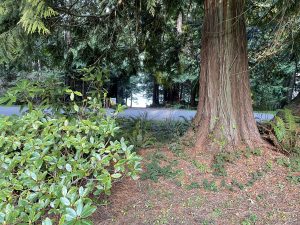
by Jean Andrianoff
One morning recently, I walked out of the kitchen into the living room to be greeted by an intense blaze of light shining through the southeast side of the living room window as the rays of the rising sun reflected off the water. I had never before seen light coming from just that spot. My point of view at that particular moment perfectly revealed the glory of the sunlight on the water. The angle of the sun relative to the water and to the gap in the tree branches created the perfect perspective.
Perspective also matters when you attend a ballet or concert or sports event. There’s a reason tickets closer to the performance cost more. Twice in my life, I was privileged to attend a performance of the Bolshoi Ballet. The first time, I sat in the “nose-bleed” section of the Bolshoi Theater in Moscow, entranced by where I was and who was performing, but with only the most remote view of the performers. The second time, I was in the Thailand Cultural Center, where the Bolshoi had come to perform in honor of the Thai king’s 60th birthday. There, I could afford seats near the front, where the difference in perspective was breathtaking. I could see facial expressions and perceive the effort and skill required to create the illusion of weightlessness. From that viewpoint, I could appreciate the full glory and beauty of the performance.

Bolshoi Ballet – wikimedia commons (public domaiin)
On this side of eternity, our perception of the glory of God is limited. As God explained to Moses, no human can see His face, or the fullness of His glory, and live. Jesus showed mankind glimpses of God’s glory, but He wants more for us. He wants us to see the full extent of that glory, a glory that we will ultimately reflect (2 Corinthians 3:18). In His final prayer for all believers, Jesus prayed:
Father, I desire that they also, whom you have given me, may be with me where I am, to see my glory that you have given me because you loved me before the foundation of the world (John 17:24, ESV).
His desire is that we may stand with Him in Heaven where we will enjoy the perfect perspective of God’s glory as we gaze at Jesus, our perception no longer constrained by human limitations. As Jesus acknowledged, His glory is a love-gift from God. Jesus wants to pass along that love so that we may perceive His glory and, as we see it, ultimately to reflect it.
This new bundle is on sale until May 11th and includes our best selling book, To Garden with God and The Gift of Wonder Prayer Cards.

As an Amazon Associate, I receive a small amount for purchases made through appropriate links.
Thank you for supporting Godspace in this way.
When referencing or quoting Godspace Light, please be sure to include the Author (Christine Sine unless otherwise noted), the Title of the article or resource, the Source link where appropriate, and ©Godspacelight.com. Thank you!

